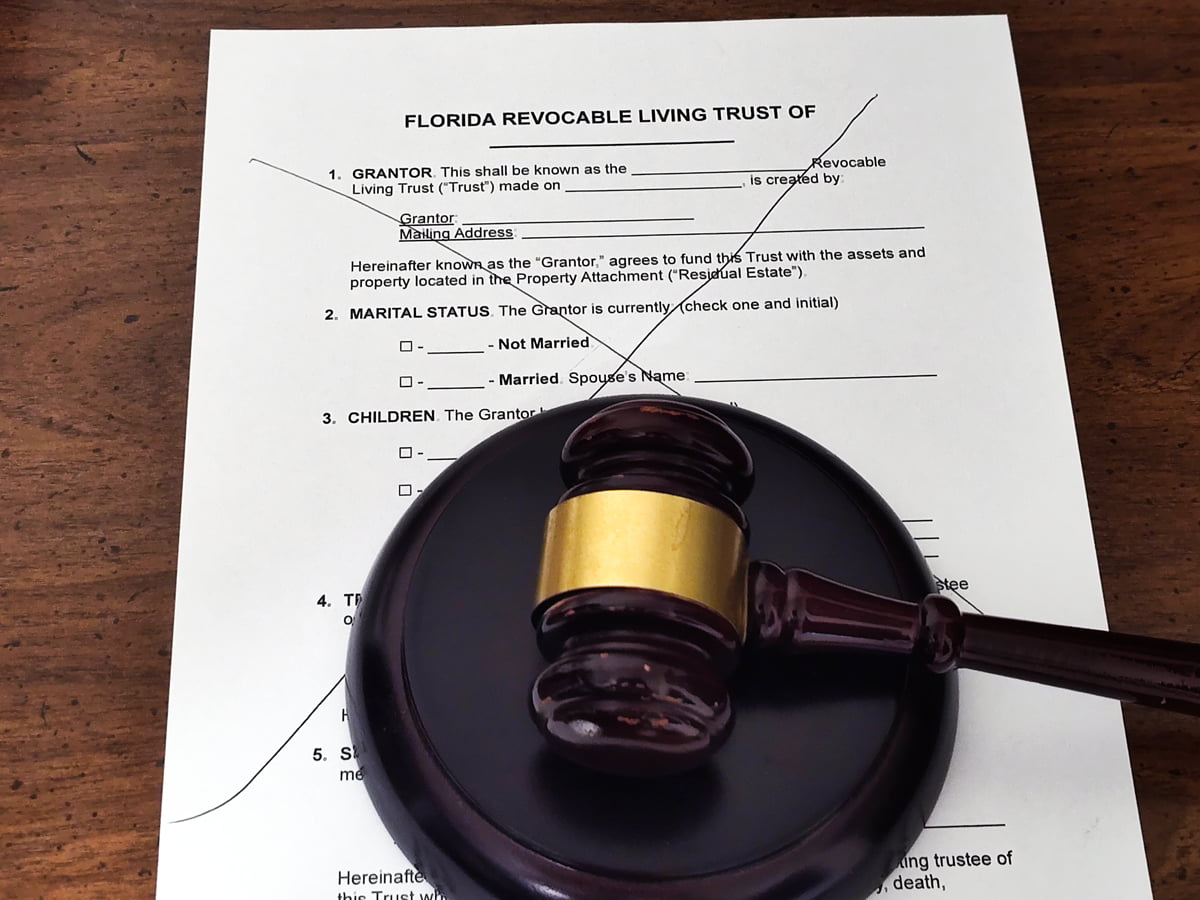Florida Estate Litigation Attorneys
When disputes arise over a loved one’s estate, emotions run high and the legal process can be overwhelming. Whether you’re a beneficiary, personal representative, or heir with concerns about a will, trust, or estate plan, our attorneys at Di Pietro Partners are here to help.
Our Florida estate litigation lawyers have decades of trial experience and have handled high-stakes disputes involving wills, trusts, fiduciary misconduct, and probate fraud. We represent clients throughout the state in contested probate cases, inheritance disputes, and other estate-related litigation.
Our Estate Litigation Lawyers on TV
What is Estate Litigation?

Estate litigation involves legal disputes over the administration, distribution, or validity of a deceased person’s estate. These conflicts often arise when beneficiaries, heirs, or personal representatives disagree over the terms of a will or trust, question the mental capacity of the decedent, or suspect misconduct such as undue influence, fraud, or breach of fiduciary duty.
Estate litigation can include will contests, trust disputes, inheritance claims, removal of executors or trustees, and lawsuits involving mismanagement of estate assets. Because these matters involve complex probate laws and emotionally charged family dynamics, it’s critical to work with an experienced estate litigation attorney who can protect your rights and resolve the dispute effectively.
Legal Grounds for Estate Litigation in Florida
Estate litigation often arises from serious legal concerns surrounding a decedent’s will, trust, or the administration of their estate. Disputes may involve excluded heirs, questions about the validity of documents, or mismanagement by executors or trustees. Below are the most common legal grounds for estate-related litigation in Florida:
Undue Influence – Occurs when someone pressures or manipulates the decedent into changing their estate plan to unfairly benefit a specific individual. Often tied to elder abuse or coercion by caregivers or family members.
Breach of Fiduciary Duty – Executors and trustees must act in the best interests of the estate and its beneficiaries. Failure to follow the law, mismanagement of assets, or self-dealing can result in removal or legal liability.
Improper Execution – Florida law requires strict formalities when executing wills and trusts. Missing witnesses, forged signatures, or other procedural errors can open the door to legal challenges.
Fraud or Forgery – If an estate document was fabricated, altered without consent, or signed under false pretenses, a court may invalidate the document.
Removal of a Trustee – When a trustee is unfit or violates their legal duties, beneficiaries may seek their removal through the courts.
Lack of Testamentary Capacity – To create a valid will in Florida, the testator must have “testamentary capacity.” This means they understand the nature of their assets, who their natural heirs are, and the legal effect of the will. Wills signed under conditions like Alzheimer’s, dementia, or mental confusion may be invalidated.
Tortious Interference with Inheritance – This occurs when a third party deliberately prevents someone from receiving an expected inheritance through wrongful acts like fraud, duress, or undue influence. Unlike will contests, this is often pursued as a separate civil lawsuit when probate remedies are insufficient. Florida courts may award compensatory and even punitive damages if the interference is proven.
Misrepresentation – Involves knowingly providing false information to the testator to influence the contents of their estate plan. This includes lies about other heirs, assets, or the legal effect of the documents, and may rise to the level of fraud if intent to deceive is proven.
Duress or Coercion – This is distinct from undue influence and deserves its own call-out. Florida courts treat coercion differently, and the emotional tone of these cases makes them resonate with clients.
Insane Delusion – Include this as a subset of lack of capacity. It may not need its own header unless the page is extensive, but referencing it as a special category strengthens the capacity argument.
Disinheritance or Omitted Heirs – Legal action may arise if a rightful heir is left out of the estate without clear legal justification, particularly in blended families or second marriages.
Conflicting or Ambiguous Documents – When multiple versions of a will or trust exist or when the language is vague courts may need to intervene to interpret the decedent’s true intent.
Each case is fact-specific, and outcomes depend on the quality of evidence and legal representation. Di Pietro Partners has the experience to guide clients through these emotionally charged and high-stakes disputes.
Why Hire Di Pietro Partners for Florida Estate Litigation?
When your inheritance, family legacy, or role as a fiduciary is under attack, you need more than a probate lawyer, you need a seasoned litigator with a proven track record in Florida’s most contested estate battles.
At Di Pietro Partners, we represent clients on both sides of complex estate disputes, including heirs, beneficiaries, executors, and trustees. Whether you’re defending a valid estate plan or challenging misconduct, we bring courtroom experience, deep legal knowledge, and a results-driven approach to every case.
- 20+ Years of Probate Trial Experience
With over 70 jury trials and hundreds of evidentiary hearings, our team is prepared to fight in court rather than just negotiate. Many probate lawyers avoid litigation. We embrace it from day one. - Dual-Sided Expertise
David Di Pietro is one of the few Florida attorneys who successfully represents both fiduciaries and challengers in high-stakes estate and trust litigation, giving us insight from every angle. - Multimillion-Dollar Results in Estate & Trust Disputes
We’ve secured seven-figure outcomes in cases involving undue influence, trustee misconduct, will contests, and breach of fiduciary duty. - Nationally Trusted Legal Analyst
Founder David Di Pietro appears regularly on Fox News, Court TV, and CNBC for expert legal commentary. His courtroom presence and legal insights are respected by both juries and national audiences.
About Our Estate Litigation Team
At Di Pietro Partners, our estate litigation team is composed of seasoned trial attorneys with a statewide and national reputation for success in high-conflict probate, will, and trust disputes. Led by founding partner David Di Pietro, our lawyers bring decades of courtroom experience to each case.
We represent heirs, beneficiaries, executors, trustees, and other fiduciaries in complex estate disputes throughout Florida. Whether your case involves a contested will, trust amendment, breach of fiduciary duty, or misconduct by an estate representative, our team knows how to navigate the courtroom and win.
David Di Pietro
Founding Partner
A nationally recognized trial attorney and legal analyst for Fox News, CNBC, and Court TV, David has tried over 70 jury trials and led multimillion-dollar cases involving contested wills, trust amendments, and fiduciary misconduct. His experience includes high-profile litigation and leadership as former chairman of one of the nation’s largest public healthcare systems giving him a unique understanding of fiduciary and institutional accountability.
Nicole 'Niki' Martell
Partner
With more than 50 trials under her belt, Niki is a dynamic litigator with deep experience in probate, guardianship, and healthcare law. She’s known for defending physicians, protecting vulnerable family members, and litigating estate disputes with efficiency and resolve. Her ability to merge courtroom skill with compassionate legal counsel makes her a vital asset in complex family estate matters.
Rodolfo 'Rudy' Mayor
Partner
Rudy focuses on estate and trust litigation, business disputes, and healthcare fraud. His career includes service at the U.S. Department of Justice and involvement in high-value, high-stakes cases involving inheritance, fraud, and fiduciary disputes. Rudy is known for his calm demeanor, strategic litigation planning, and ability to resolve emotionally charged cases with professionalism and precision.
Florida Probate Laws
Understanding Florida probate laws is essential when dealing with estate disputes. These laws govern how wills are validated, estates are administered, and disagreements are resolved in probate court.
The Florida Probate Code, found in Chapters 731 through 735 of the Florida Statutes, outlines the responsibilities of all involved parties beneficiaries, heirs, personal representatives, and creditors. Recent rule changes also clarify how to handle foreign-language wills, set stricter deadlines for filing objections, and specify how lost or destroyed wills can be validated.
For families involved in a contested estate, these laws provide the legal framework for ensuring a fair and orderly process. Whether you’re seeking to uphold a will or challenge its legitimacy, understanding probate law is critical to protecting your rights.
For a deeper legal overview, read our Complete Guide to Florida Probate Laws.
Estate Litigation & Probate Law Updates in 2025
Florida’s probate laws have seen several important updates in 2025, directly affecting how estate litigation and will contests are handled across the state.
1. Expansion of Vexatious-Litigant Protections
Effective July 1, 2025, Florida’s Vexatious Litigant Law now applies to adversary probate proceedings, allowing courts to limit repeat, frivolous litigation even by pro se parties. The look-back period for vexatious behavior increased from five to seven years.
2. Stricter Probate Rules for Objections
New amendments to the Florida Probate Rules clarify that objections to a will’s validity, venue, or the court’s jurisdiction must be filed within 90 days of receiving notice—except in rare cases involving misinformation. Additionally, foreign-language wills must now be accompanied by certified English translations, and courts are required to verify that all necessary authorizations are properly executed.
3. Revised Standards on Testamentary Invalidity
Under Chapter 733 updates, finalized in 2025, a will admitted to probate is now considered conclusive proof of due execution—absent clear evidence of fraud, duress, mistake, or undue influence. However, interested parties may still petition to revoke probate by demonstrating those issues under revised statutes
Florida Estate Litigation FAQs
Q. What is estate litigation?
Estate litigation involves legal disputes over the administration of a person’s estate after death. This includes contests over wills, challenges to trusts, claims of fiduciary misconduct, disputes among heirs, and actions against personal representatives or trustees.
Q. How long do I have to contest a will or trust in Florida?
For wills, the general deadline is 90 days after receiving formal notice of probate—but this may be shortened to 20 days if formal notice is served before probate. For trusts, the statute of limitations is typically four years, but shorter deadlines may apply based on when notice of trust administration is received. Timing is critical to speak with a probate litigation attorney immediately.
Q. Who can challenge a will or trust?
Anyone with legal standing may bring a challenge. This typically includes:
- Beneficiaries (named or removed)
- Heirs under Florida intestacy laws
- Creditors or other parties with a financial interest in the estate
Q. What are valid reasons to contest a will or trust?
Legal grounds include:
- Undue influence by a caregiver, family member, or third party
- Lack of mental capacity due to dementia, Alzheimer’s, or illness
- Improper execution, such as missing signatures or witnesses
- Fraud, duress, or forgery
- Breach of fiduciary duty by a trustee or personal representative
Q. What happens when you contest a will or trust in Florida?
The process usually unfolds in one of three ways:
- Early dismissal if the claim lacks merit
- Settlement through mediation or negotiation
- Trial in probate court, where both parties present evidence and a judge issues a ruling
Q. Do I need a lawyer for an estate dispute?
Yes. Florida probate litigation is complex and governed by strict procedural rules. Whether you’re challenging a will, defending a trust, or asserting your rights as a beneficiary, having experienced legal counsel is essential.
Q. Do you represent beneficiaries in estate litigation?
Yes. Di Pietro Partners regularly represents beneficiaries in disputes involving unfair distributions, trustee misconduct, will fraud, and other estate-related claims.
Q. Do you defend trustees, executors, and personal representatives?
Absolutely. Our attorneys have extensive experience defending fiduciaries accused of wrongdoing. We help clients comply with Florida law, avoid personal liability, and protect the integrity of the estate.
Q. What if someone dies without a will?
If a person dies intestate (without a valid will), Florida’s intestacy laws govern who inherits their property. Typically, this means the estate is divided among the spouse, children, or other close relatives. We assist clients in resolving complex intestate succession cases.
Q. What’s the difference between will contests and trust litigation?
While both involve estate disputes, will contests focus on the validity of the deceased’s will, while trust litigation centers on the management or terms of a trust. Each follows different rules and timelines but may arise from similar legal concerns like undue influence or lack of capacity.
Estate Litigation Cases Involving Trusts

These responsibilities and duties are outlined in the Florida Trust Code.
In short, a trustee has been appointed by the settlor to oversee that assets in a trust are being fairly and properly administered to the named beneficiaries.
Unfortunately, in some cases, a trustee mishandles these assets and certain beneficiaries do not receive their proper share. There may be other issues with the way a trust is being handled or even issues with the trust itself. These issues may lead to formal legal objections and ultimately litigation.
Common legal disputes involving trusts include:
- Breach of fiduciary duty by the trustee
- Unlawful distribution of assets held within the trust.
- Mental capacity issues or undue influence over the settlor
- Sudden modification of the trust
- Issues with formalities (i.e. signing, witnessing, executing)
Our law firm is highly experienced in estate litigation cases involving trusts. If you’re a trustee and require legal defense, or you’re a beneficiary raising a formal legal objection over the actions of a trustee, we can help.
Estate litigation Cases Involving Wills

In Florida, legal disputes involving wills are filed in probate court and typically must be submitted before completion of the probate process. These legal disputes may involve issues with the document, or issues with the behavior of a family member, caregiver, or personal representative.
For instance, one of the more common reasons a will is challenged is due to the validity of the document. The validity of a will may be challenged if there’s potential issues with the competency of the party drafting it. It may also be challenged if the document was drafted under false pretenses or if the will was improperly signed, executed, or there’s existing wills already in place.
Reasons for challenging a will include:
- Improper Execution
- Diminished Mental Capacity
- Unlawful Changes to the Document
- Misrepresentation
- Foul Play From a Family Member or Third Party
Estate Litigation Cases Involving Notice of Administration
When a decedent passes away, all interested parties will receive a Notice of Administration. This formal document not only provides notification of a decedent’s death but also notifies them of the filing of the last will and testament for probate purposes. Any objections to the validity of the will and/or the probate proceedings must be made within a certain time period otherwise the individual will forfeit their right to do so.
There are a number of different legal bases for litigation to challenge the validity of a will and probate proceedings in order to stop the administration of an estate. These include but are not limited to:
- Lack of Mental Capacity
- Undue Influence
- Duress
- Intentional Interference with an Expectancy
- Improper Signing of the Will
When an individual receives a Notice of Administration that informs them of a limited time frame for a response, the provisions of the notice will override any deals, promises or assurances that not contesting will result in that individual getting their fair share. Oftentimes, those responsible for administering the estate will use this as a way to cheat an individual out of their right to contest a will or the probate proceedings, as these verbal agreements are simply unenforceable.
It is vital that individuals rely solely on the timeline laid out in the notice provisions and work with an attorney specializing in estate litigation to file a formal dispute through the proper legal channels. This will ensure that their best interests are protected and that they have the best possible legal outcome in their litigation case.
Speak With an Estate Litigation Lawyer
Navigating disputes over wills, trusts, and estates can be both legally complex and emotionally taxing. Most individuals are unfamiliar with the precise procedures, critical deadlines, and evidentiary standards required to successfully contest or defend an estate in court. An experienced estate litigation attorney brings not only legal knowledge but also courtroom experience, insight into probate judges, and the negotiation skill to achieve the best outcome for your case.
Based in Fort Lauderdale with offices throughout Florida, Di Pietro Partners represents clients statewide in all types of probate disputes no matter where you live. If you’ve been appointed personal representative for a Florida resident or are involved in a contested will or trust, reach out for a free and confidential case review.
Contact us today to speak with a Florida estate litigation lawyer who can protect your rights and guide you through every step of the process.








